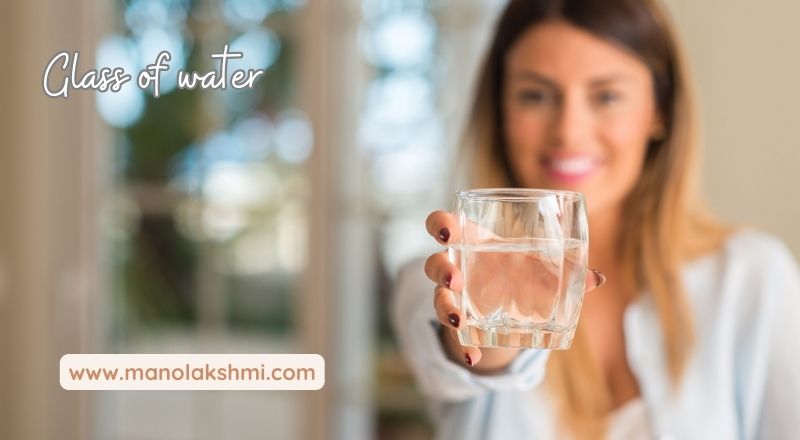Drinking water refers to water that is safe and suitable for humans to consume. It is water that has undergone treatment or purification processes to remove contaminants and impurities, making it safe for drinking and other domestic uses. Drinking water should meet specific quality standards set by regulatory authorities to ensure it is free from harmful bacteria, viruses, chemicals, and other pollutants. Having access to clean and safe drinking water is crucial for maintaining optimal health and avoiding illnesses caused by contaminated water.
The Absorption of nutrients and minerals in our meals. For Example, fats desire water. so, that it will be damaged down and utilized by the frame. Water Additionally allows flushing out. The waste fabric in our bodies accordingly allows us. To hold us in the most useful health.
There isn’t any want to drink bottled water. As in maximum regions faucet water is flawlessly safe. If you do select the bottled variety, steer clear of the flavored ones.
The merchandises comprise sweeteners that now no longer. Against weight reduction and can be carcinogenic. If you no longer drink enough water, you may feel lethargic, attempted, and confused.
Drinking water Health Benefits
Hydration:
Drinking enough water helps keep the body hydrated, which is necessary for proper bodily functions and overall health. Drinking enough water helps keep the body hydrated, which is necessary for proper bodily functions and overall health. Water makes up about 60% of the human body and is involved in many important bodily functions, such as transporting nutrients and oxygen to cells, regulating body temperature, and removing waste products. When the body is dehydrated, it cannot function properly and can lead to a variety of health problems, such as fatigue, headaches, constipation, and kidney stones.

There are a few simple ways to tell if you are dehydrated. One is to look at the color of your urine. When your urine is dark yellow or amber, it indicates dehydration. “Another way to tell is to pay attention to your thirst. If you are not thirsty, you are probably hydrated. However, if you are feeling thirsty, it is a sign that you are already dehydrated and need more water.
The amount of water you need to drink each day depends on a variety of factors, such as your age, activity level, and climate. However, a good rule of thumb is to drink eight glasses of water daily. If you find it difficult to drink plain water, you can try adding flavor to it with slices of fruit or cucumber, or by drinking sparkling water. You can also get water from other sources, such as fruits and vegetables.
Drinking enough water is essential for good health. By staying hydrated, you can help your body function properly and reduce your risk of developing health problems.
Flushing out toxins:
Water plays a vital role in flushing out waste and toxins from the body through urine and sweat, which helps maintain a healthy functioning of the body.
“Lubricating joints and protecting organs are some of the benefits provided by this substance. Drinking plenty of water is crucial for preserving good health. It can prevent dehydration, constipation, and kidney stones.
Here are some specific ways that water helps the body:
Flushes out toxins: Water helps to dissolve waste products and toxins in the body, and then carries them out of the body through urine and sweat.
Lubricates joints: Water helps to keep joints lubricated and functioning properly.
Protects organs: Water helps to cushion organs and protect them from damage.
Prevents dehydration: Dehydration can cause many health problems, including fatigue, dizziness, and headaches. Drinking plenty of water can help to prevent dehydration.
Prevents constipation: Drinking water
Water helps to soften stool and make it easier to pass.
Prevents kidney stones: Kidney stones are formed when minerals in the urine crystallize and form hard deposits. Drinking plenty of water can help to dilute the urine and prevent minerals from crystallizing.
Weight management: Drinking water can help with weight loss and weight management by increasing feelings of fullness and boosting metabolism.
Not only does drinking water have numerous health benefits, but it can also be a powerful tool for weight loss. By quenching your thirst and promoting a sense of fullness, water can help curb overeating and decrease calorie intake. Boosting your metabolism and staying hydrated go hand in hand, making water an essential element in shedding unwanted pounds. Before meals, try sipping on some H2O to control portion sizes and prevent overindulging. Swapping out sugary beverages for water can also significantly reduce your daily calorie intake. Stay hydrated and watch the fat melt away!
Joint health: Adequate water intake helps lubricate the joints and lessen the risk of joint pain and inflammation.
Digestive health: Water aids in digestion and helps prevent constipation by keeping the digestive system running smoothly.
Skin health:
Proper hydration can improve skin elasticity, texture, and complexion. Proper hydration can improve skin elasticity, texture, and complexion. When the skin is hydrated, it is better able to retain moisture, which helps to plump up the skin and reduce the appearance of fine lines and wrinkles. Additionally, hydration can help to improve the skin’s texture by smoothing out rough patches and making the skin feel softer and more supple. hydration can help to improve the skin’s complexion by giving it a more radiant and healthy glow.

There are many ways to improve skin hydration, including drinking plenty of water, using hydrating skincare products, and avoiding harsh soaps and cleansers. Drinking water is essential for overall health, and it is also important for skin health. When the body is dehydrated, the skin can become dry and flaky, which can lead to premature aging. Hydrating skincare products can help to replenish the skin’s moisture levels and improve its elasticity and texture. These products typically contain ingredients such as hyaluronic acid, glycerin, and ceramides. Harsh soaps and cleansers can strip the skin of its natural oils, which can lead to dehydration. It is important to choose gentle, hydrating cleansers that will not irritate the skin.
By following these tips, you can improve your skin’s hydration and enjoy the benefits of healthier, more youthful-looking skin.
Regulating body temperature:
Water helps regulate body temperature by sweating and releasing heat from the body.
Water helps regulate body temperature by sweating and releasing heat from the body. When the body is too hot, the sweat glands produce sweat, which evaporates and cools the skin. This process is called evaporative cooling. Water also helps to transport heat away from the body’s core, where it is produced by the metabolism, to the skin, where it can be dissipated through evaporation. In addition, water helps to maintain the body’s electrolyte balance, which is important for regulating body temperature.
Energy levels: Even mild dehydration can lead to decreased energy levels and mental fatigue, so staying properly hydrated can help maintain energy levels and cognitive function.
Immune support:
Drinking water helps support the body’s immune system by flushing toxins and carrying nutrients to the cells.
Drinking water helps support the body’s immune system by flushing toxins and carrying nutrients to the cells. Water helps to keep the lymphatic system flowing, which is responsible for carrying white blood cells throughout the body to fight infection. It also helps to hydrate the mucus membranes, which act as a barrier to keep harmful bacteria out of the body. Water aids in nutrient absorption by cells, while dehydration hinders proper body function and increases susceptibility to illness.
Here are some specific ways that drinking water can help support the immune system:
Flushes toxins: Water helps to flush toxins out of the body through the kidneys and bowels. These toxins can weaken the immune system and make it more difficult for the body to fight off infection.
Carries nutrients: Water helps to carry nutrients to the cells, including vitamins, minerals, and oxygen. These nutrients are essential for the immune system to function properly.
Hydrates mucus membranes: The mucus membranes in the nose, throat, and lungs help to trap harmful bacteria and viruses. When these membranes are hydrated, they are more effective at preventing infection.
Dissolves nutrients: Water helps to dissolve nutrients so that they can be absorbed by the cells. This is important for the immune system, as many nutrients are essential for its function.
drinking water is an important part of maintaining a healthy immune system. By drinking plenty of water, you can help to keep your immune system strong and protect yourself from illness.
Kidney health:
Water is essential for the proper functioning of the kidneys, helping them filter and excrete waste products from the body.
Water is essential for the proper functioning of the kidneys, helping them filter and excrete waste products from the body. When the body is dehydrated, the kidneys can’t function properly and waste products can build up in the blood. This can lead to a number of health problems, including kidney stones, high blood pressure, and even kidney failure.
Drinking plenty of water is one of the best ways to keep your kidneys healthy. The amount of water you need each day depends on a number of factors, including your age, activity level, and climate. However, most adults should aim to drink at least eight glasses of water per day.
In addition to drinking water, you can also help your kidneys stay healthy by eating a healthy diet, getting regular exercise, and avoiding tobacco and excessive alcohol consumption.
How much water do you need for someone?
Every day you lose water through your breath, sweat, beam, and bowel movements. To make your body correct, the water should be filled with the highest drinks and foods with water.
What proportion of the common and healthy adults is living in the most modern climate? A U.S. National Academy of Sciences, Engineering, and Drugs decided that the adequate daily liquid intake was:
About 15.5 cups (3.7 liters) of fluids for males, About 11.5 cups (2.7 liters) of fluid for women every day.
These suggestions suck fluids from water, alternatives, and food. 2 percent of the daily liquid intake is sometimes from the food and the rest of the drinks.
Click here: Children Care: Basic Tips for Keeping Children’s Hygiene
What about the advice to drink eight glasses a day?
You may have seen the suggestion to drink every day eight glasses. Remembering is remembered, and it is an affordable target.

Most healthy people will threaten to drink and alter nature when drinking thirst. For a few people may be less than everyday glasses. However, people may want to be in addition.
You have to modify your total liquid intake that supports multiple factors:
Relaxation. If you’re doing the process of sweating, you need to drink additional water to hide the liquid loss. Before a knee grease, drinking and water are essential for drinking.
The habitat. The hottest or wet weather will cause you to sweat and need more fluid. A high allegation can be caused by the deepest.
All around fitness. If you have a fever, rise, or symptoms, your body loses the fluid. Drink the doctor’s recommendation to drink more water or drink oral rehydration solutions. Alternative-conditioning conditions requiring high liquid intake are influenced by the bladder and embrace the stones.
Incubation and breastfeeding. If you are pregnant or breastfeeding, you will also want to be liquid in hydrous.
Is the only choice to be unstuck?
Not. You do not have to promise only water in fulfilling your liquid options. The addition of eating a separate portion of yourself. For example, for many fruits and vegetables, watermelon, and lettuce, measuring 100% of the water squares the water.
In addition, drinks such as milk, juice, and tasting tea are often watered. Separately and caffeinated drinks like soda contribute to your daily water intake.
However, go directly to sugar-sweet drinks. Regular soda, energy or sports drinks, and alternative sweet drinks sometimes contain a great deal of side sugar, which can offer additional calories than required.
